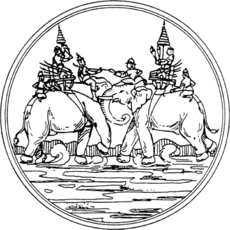Burmese–Siamese War (1568–69)
| Burmese–Siamese War (1568–1570) | |||||||
|---|---|---|---|---|---|---|---|
 War elephants depicted from a later Siam–Burma war. |
|||||||
|
|||||||
| Belligerents | |||||||
|
Kingdom of Lan Xang |
Kingdom of Burma |
||||||
| Commanders and leaders | |||||||
|
Setthathirath |
Bayinnaung Mahathammarachathirat Thado Minsaw Binnya Dala |
||||||
| Units involved | |||||||
|
Lan Xang Army |
Royal Burmese Army | ||||||
| Strength | |||||||
| Unknown |
Burmese sources |
||||||
Kingdom of Burma
Burmese Controlled Thai States including:
Burmese sources
Bayinnaung's five armies Invasion force:
54,600 men, 5,300 horses and 530 elephants
Combined with Phitsanulok army:
The Burmese–Siamese War (1568–1570) was a military conflict fought between the Kingdom of Ayutthaya (Siam) and the Kingdom of Burma. The war began in 1568 when Ayutthaya unsuccessfully attacked Phitsanulok, a Burmese vassal state. The event was followed by a Burmese intervention which resulted in the 2 August 1569 defeat of Ayutthaya, which became a Burmese vassal state. Burma then moved towards Lan Xang, occupying the country for a short period of time until retreating in 1570.
In 1485, Mingyi Nyo usurped the throne of the Burmese kingdom of Toungoo after murdering his uncle. In the following years Mingyi Nyo managed to retain the kingdom's independence while also leading several successful campaigns against Mon states. Toungoo also benefited from the collapse of the once dominant Ava Kingdom, receiving numerous refugees from neighboring kingdoms that were unable to maintain the security of their citizens. In 1530, Tabinshwehti was crowned king of Toungoo following the death of his father. Tabinshwehti continued to expand his domain, overtaking Hanthawaddy and cementing Toungoo's status as an empire.
Internal struggles over the control of the Ayutthayan (Siam) throne between the Suphannaphum Dynasty and the Uthong Dynasty culminated on 1546, after the death of king Chairacha. Chairacha's successor Yot Fa was killed in 1548, with conspirator Khun Chinnarat taking the throne. 42 days later Chinnarat was assassinated by nobles loyal to the Suphannaphum Dynasty, who installed Chairacha's relative as King Maha Chakkraphat. Tabinshwehti exploited the internal turmoil in Ayutthaya by instigating the first conflict between the two countries. The Burmese–Siamese War (1547–49) resulted in the Burmese capture of the Upper Tenasserim coast down to Tavoy, while Ayutthaya managed to protect the rest of its territory.
...
Wikipedia
